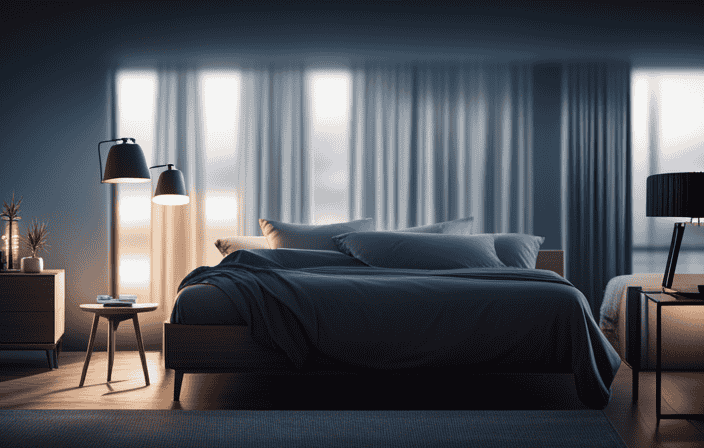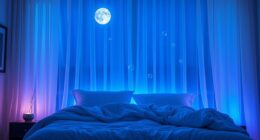Getting a good night’s sleep is key to having a productive day, so it’s important to create the ideal conditions for rest in order to recharge and take on whatever challenges lie ahead. By optimizing our sleep environment, we can enhance the quality of our sleep and wake up feeling refreshed.
From choosing the right mattress to establishing a consistent sleep schedule and minimizing exposure to blue light, there are several factors to consider.
In this article, we will explore the key elements of optimizing the sleep environment and how they contribute to rejuvenating mornings.
Key Takeaways
- Investing in a better mattress improves sleep quality
- Separating from technology before sleep is beneficial
- Establishing a relaxing evening routine aids in better sleep
- Creating a conducive sleep environment enhances mental wellbeing
Creating the Optimal Sleep Environment
Creating the optimal sleep environment is crucial for promoting better sleep quality and feeling recharged in the mornings. Factors such as investing in a suitable mattress, maintaining a consistent sleep schedule, minimizing technology usage before bed, and establishing a relaxing evening routine all contribute to a conducive sleep environment.
Creating a sleep sanctuary involves investing in a better mattress that suits individual needs, as old and lumpy mattresses hinder sleep effectiveness.
Maintaining a consistent sleep schedule is important, as frequent deviations confuse the body and staying up late regularly has drawbacks.
Minimizing technology usage before bed is also essential, as the blue light emitted by devices disrupts natural sleep preparation.
Lastly, establishing a relaxing evening routine with activities like yoga, meditation, or reading promotes better sleep.
Improving sleep hygiene through these practices can significantly enhance sleep quality and leave individuals feeling recharged in the mornings.
Choosing the Right Mattress
Selecting the appropriate mattress significantly impacts the quality of sleep, although some may argue that any mattress will suffice for a good night’s rest. However, mattress shopping should not be taken lightly, as it plays a crucial role in providing comfort and support for the body during sleep.
When considering a new mattress, one should take into account their personal preferences and needs. The size of the mattress is an important aspect to consider. While a larger mattress may provide more space to move around, it may not fit well in a smaller bedroom. On the other hand, a smaller mattress may be more suitable for a single sleeper or a smaller living space.
Ultimately, choosing the right mattress size is essential for optimizing sleep environment and ensuring a restful night’s sleep.
Maintaining a Consistent Sleep Schedule
Maintaining a consistent sleep schedule is crucial for promoting healthy sleep patterns and optimizing overall sleep quality. Going to bed at the same time every night and waking up at the same time every morning helps regulate the body’s internal clock, also known as the circadian rhythm. This consistency allows the body to anticipate and prepare for sleep, leading to more restful and rejuvenating nights.
On the other hand, irregular sleep patterns, such as staying up late or having frequent deviations from the sleep schedule, can disrupt the circadian rhythm and have a negative impact on sleep quality. Furthermore, sleep deprivation resulting from inconsistent sleep schedules can lead to a variety of mental health issues, including increased stress, anxiety, and mood disturbances.
It is therefore essential to prioritize maintaining a consistent bedtime and wake-up time to ensure optimal sleep and mental well-being.
Reducing Exposure to Blue Light
Reducing exposure to blue light before bedtime can positively impact sleep quality and promote better overall sleep. Blue light emitted by electronic devices, such as smartphones, tablets, and computers, can interfere with the body’s natural sleep-wake cycle.
Using blue light filters or adjusting device settings to reduce the amount of blue light emitted can help minimize its disruptive effects on sleep. Blue light filters are available as apps or software that can be installed on devices, and they work by reducing the blue light emitted from the screen. Additionally, adjusting device settings, such as reducing screen brightness or enabling night mode, can also help reduce blue light exposure.
By implementing these strategies, individuals can create a more conducive sleep environment and improve their sleep quality.
Establishing a Relaxing Evening Routine
Establishing a consistent evening routine that includes calming activities like reading or practicing mindfulness can contribute to a more peaceful transition into sleep and improve overall sleep quality. Engaging in relaxing activities before bedtime helps signal to the body that it’s time to unwind and prepare for sleep. Here are three beneficial bedtime rituals to consider:
-
Reading: Engaging in a quiet and leisurely activity like reading can help calm the mind and promote relaxation. It allows you to escape from the stresses of the day and focus on a different narrative, which can aid in reducing racing thoughts and promoting a restful state.
-
Practicing mindfulness: Engaging in mindfulness exercises such as deep breathing, meditation, or gentle stretching can help relax both the mind and body. These practices promote a sense of calmness, reduce stress, and prepare the body for sleep.
-
Creating a soothing environment: Setting the stage for a restful night’s sleep involves creating a peaceful sleep environment. This can include dimming the lights, using a white noise machine or calming music, and ensuring the room temperature is conducive to sleep.
By incorporating these relaxing activities into your evening routine, you can establish a peaceful transition into sleep and improve the overall quality of your rest.
Avoiding Heavy Meals and Excessive Drinking
To continue optimizing the sleep environment for recharged mornings, it is essential to establish a relaxing evening routine. This routine should include avoiding heavy meals and excessive drinking before bed.
Heavy meals close to bedtime can have negative effects on sleep quality. Overeating and consuming fatty or spicy foods can lead to discomfort, bloating, and indigestion, making it difficult to fall asleep and stay asleep.
Additionally, excessive drinking before bed can disrupt sleep patterns. Alcohol may initially induce drowsiness, but it can disrupt the normal sleep cycle, leading to restless nights and a less restorative sleep.
By avoiding heavy meals and excessive drinking before bed, individuals can promote better sleep quality and wake up feeling more refreshed in the morning.
Managing Stress and Anxiety
Managing stress and anxiety plays a crucial role in improving sleep quality and promoting a more restorative night’s rest. Anxious thoughts and stress can hinder the ability to fall asleep and maintain a deep sleep throughout the night. Incorporating natural remedies for anxiety and mindfulness techniques for stress reduction can help create a more relaxed state of mind before bedtime. Some natural remedies for anxiety include herbal teas like chamomile or lavender, essential oils such as lavender or bergamot, and supplements like magnesium or valerian root. Mindfulness techniques such as deep breathing exercises, progressive muscle relaxation, and guided meditation can also help reduce stress levels and promote a calm and peaceful mindset before sleep. By managing stress and anxiety, individuals can create a more optimal sleep environment and experience a more rejuvenating night’s rest.
| Natural Remedies for Anxiety | Mindfulness Techniques for Stress Reduction |
|---|---|
| Herbal teas (chamomile, lavender) | Deep breathing exercises |
| Essential oils (lavender, bergamot) | Progressive muscle relaxation |
| Supplements (magnesium, valerian root) | Guided meditation |
Using Sleep Products for Comfort
Utilizing sleep products can greatly enhance the comfort and quality of one’s sleep, leading to a more rejuvenating night’s rest. When it comes to optimizing the sleep environment, there are various sleep products that can aid in achieving a better sleep experience. Here are some sleep product recommendations that can contribute to a more comfortable and restful sleep:
-
Mattress Toppers: Adding a mattress topper can provide extra cushioning and support, improving the overall comfort of the mattress.
-
Pillows: Investing in good quality pillows that align with your sleep position can alleviate neck and back pain, promoting a more comfortable sleep.
-
White Noise Machines: These devices produce soothing sounds, such as ocean waves or rain, to mask disruptive noises and create a calming sleep environment.
-
Alternative Sleep Aids: Natural sleep aids like lavender essential oil, chamomile tea, or melatonin supplements can help induce relaxation and promote better sleep.
By incorporating these sleep products into your sleep routine, you can create a more comfortable and conducive sleep environment, leading to a more restful and recharged morning.
Considering Sleep Positions
In our previous discussion, we explored the use of sleep products to enhance comfort during sleep.
Now, let us delve into the importance of considering sleep positions for optimizing the sleep environment.
Exploring alternative sleep positions is essential as it allows individuals to find the most suitable position that promotes body alignment and reduces discomfort.
Different sleep positions can have varying impacts on body alignment, which in turn affects the quality of sleep.
For instance, sleeping on the back promotes spinal alignment and can alleviate back pain, while sleeping on the side can help with snoring and sleep apnea.
On the other hand, sleeping on the stomach may lead to strain on the neck and spine.
By understanding the impact of sleep positions on body alignment, individuals can make informed choices that contribute to a more rejuvenating sleep experience.
Understanding the Benefits of Good Sleep
Enhanced overall health and cognitive function are associated with the benefits of obtaining good quality sleep. Quality sleep plays a crucial role in improving mental health and has a significant impact on overall well-being. When we sleep well, our bodies have time to repair and regenerate, which helps in maintaining optimal physical and mental functioning. Adequate sleep also contributes to improved memory, concentration, and cognitive performance. Additionally, it supports emotional well-being by reducing stress and promoting a positive mood.
To illustrate the importance of good sleep, consider the following table:
| Benefits of Good Sleep |
|---|
| Improved overall health |
| Enhanced cognitive function |
| Better memory and concentration |
| Reduced stress and anxiety |
| Positive mood |
| Optimal physical and mental functioning |
By prioritizing quality sleep, individuals can reap the benefits of improved mental health and overall well-being. It is essential to establish a consistent sleep routine, create a comfortable sleep environment, and practice good sleep hygiene to ensure restorative and rejuvenating sleep.
Enhancing Productivity Through Quality Sleep
Maximizing productivity requires prioritizing quality sleep and harnessing its transformative effects on cognitive function and overall well-being. To improve sleep hygiene and maximize sleep efficiency, consider the following strategies:
-
Establish a Consistent Sleep Schedule: Going to bed and waking up at the same time every day helps regulate the body’s internal clock and promotes better sleep quality.
-
Create a Relaxing Sleep Environment: Make sure your bedroom is cool, dark, and quiet. Use blackout curtains, earplugs, or white noise machines to block out any disruptive stimuli.
-
Limit Exposure to Technology: The blue light emitted by electronic devices can interfere with the body’s natural sleep-wake cycle. Avoid using screens before bed or use blue light filters to minimize its impact.
-
Practice Relaxation Techniques: Engaging in relaxation activities such as deep breathing, meditation, or gentle stretching before bed can help calm the mind and prepare the body for sleep.
By implementing these strategies, individuals can enhance their sleep quality, optimize their sleep environment, and ultimately improve their productivity and overall well-being.
Frequently Asked Questions
How can external factors such as noise and temperature affect sleep quality?
External factors such as noise pollution and temperature can significantly impact sleep quality. Noise disturbances can disrupt sleep cycles and lead to fragmented sleep. Extreme temperatures can cause discomfort, leading to difficulty falling asleep and maintaining a deep sleep state.
What are some tips for creating a sleep environment that promotes relaxation and restful sleep?
Creating a sleep environment that promotes relaxation and restful sleep involves sleep environment essentials such as a comfortable mattress and consistent sleep schedule. Additionally, establishing a bedtime routine with relaxing activities like reading or taking a bath can enhance sleep quality.
Can the type of mattress I choose really make a difference in my sleep quality?
Choosing the right mattress can significantly impact sleep quality and satisfaction. Research shows that investing in a better mattress improves sleep effectiveness and comfort, leading to better sleep experiences and feeling recharged after sleep.
How long does it typically take for the body to adjust to a consistent sleep schedule?
The body’s natural clock, or circadian rhythm, takes about one to two weeks to adjust to a consistent sleep schedule. Inconsistent sleep schedules can disrupt this rhythm, leading to difficulties in falling asleep and feeling groggy during the day.
Are there any alternative methods for reducing exposure to blue light besides adjusting device brightness?
Alternative methods for reducing exposure to blue light include wearing light blocking glasses and using blue light filters on devices. These methods can help minimize the disruption of natural sleep preparation and improve sleep quality.









